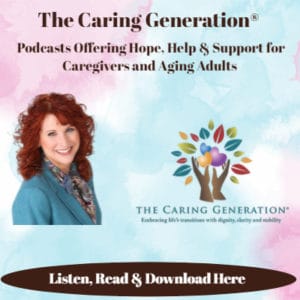Caregiving Battles: Sibling Relationships

How many of you, when young, vied for the attention of your parents? Today, how many of you feel that your parents still have “favorites” among their children? When parents age and need care, caregiving battles often occur between siblings.
Why Children Care (or Don’t) for Aging Parents
Early differences between children and perceptions of parental favorites carry forward to later life when parents need the support of adult children in caregiving situations. In addition, research by Dr. Omri Gillath and others confirms that complications of parent-child relationships can lead to refusals to provide care.
Is it possible to put aside childhood—or adult differences—to care for aging parents? What actions might support adult children to set aside past hurts, forgive, and support end-of-life family relationships with parents?
Family Relationships are Complicated
Family relationships are complicated matters. When children leave home, relationships between adult children and parents that were imperfect may be less likely to mend.
Children go on with their lives, marry, have children, and pursue careers. Exposure to life circumstances may result in children adopting different moral values and beliefs than their parents. While everyone pictures perfect families where children and their spouses get along well with both sets of parents, this isn’t always the reality.
When differences of opinion exist, future family gatherings may be limited to obligatory holidays, marriage celebrations, or funerals. Most family members can “make nice” for limited periods of time during these events and then experience relief when returning home.
Issues That Arise When Elderly Parents Need Help
What happens when a parent becomes older, frail, ill, and requires ongoing care? How then do adult children with strong opinions and dislikes come together for the parent’s benefit?
While the healthy spouse is usually the primary caregiver for the sick spouse, there may be a time when a parent asks adult children for support. For example, a parent with multiple chronic diseases, a physical disability, or Alzheimer’s or dementia diagnosis may need more day-to-day care than the healthier parent can provide.
Typically if a daughter exists, this daughter becomes the secondary caregiver. The sick parent and the daughter are the primary stop-gaps that prevent a sick parent from moving out of the home to a care community or a nursing home.
As long as everything remains in balance in this care situation, other siblings may not fully know the extent of care needs. When the caregiving balance tips and the healthy parent becomes sick, the daughter or son who was helping out begins asking for help from siblings.
Siblings on the Sidelines
 Let’s say that you have been asking for help from your brothers and sisters, and no one seems to take you seriously. Instead, they praise you for all the work you’ve done by saying, “keep doing what you’re doing,” because they don’t want to get involved.
Let’s say that you have been asking for help from your brothers and sisters, and no one seems to take you seriously. Instead, they praise you for all the work you’ve done by saying, “keep doing what you’re doing,” because they don’t want to get involved.
But now you’re at an impasse. It’s time for siblings to help, or the time is now to move mom or dad into a care community. Your siblings disagree that this is the only course of action but fail to show up to offer help. What now?
How to Manage Caregiving Battles With Siblings
Holding a family meeting in a business meeting format is one option for resolving family caregiving battles with siblings. If you’ve never organized a family meeting to discuss care for aging parents, consider these initial steps:
- Set an agenda, send invitations, and host the meeting at a neutral location like a meeting room in a public library or an online platform.
- Set ground rules for communication. Establish clear boundaries that exclude discussions of interpersonal issues and childhood wounds.
- If these are significant issues, then agree to hold a separate family counseling meeting for those wishing to participate.
- If there are concerns about impartiality, hire an independent group facilitator or moderator. Persons who offer these services include counselors, church pastors, mediators, eldercare consultants, or care navigators.
Family Meeting Goals
The facilitator’s goal is to manage the meeting agenda and the time allotted. Options and ideas to arrive at potential plans of action or the consequences of non-action guide the agenda. All attendees have the opportunity to express concerns and ask questions.
The meeting concludes with attendees identifying their commitment, level of participation, methods of participation, or inability or unwillingness to participate. Attendees must agree to accept that not all siblings can or will contribute to the care of aging parents.
In closing, the meeting is summarized, the next steps are confirmed, and a mechanism for participant follow-up and accountability is established.
Caregiving Battles: Separating Fact From Emotion
While a family meeting may seem like an impersonal method to discuss care for an aging parent, it can offer a reality check of the current situation. Children living locally who are more involved in the day-to-day can provide insights for siblings who live out of town or rarely visit.
Aging parents are not included in family meetings until adult children arrive at a consensus for making recommendations. A united front is the best option for meeting with aging parents who may manipulate or divide children they know who don’t get along.
By focusing on the fact-based care needs of parents, adult children may be able to separate past issues with sibling relationships from the aging parent issues of today. Additionally, participation may occur in a manner where adult children in conflict have little or no contact with each other but still contribute.
Caregiving Is Never Easy
Dealing with elderly parents experiencing health declines is never easy. Parents who fail to plan financially for care costs will need assistance applying for and receiving public benefits to pay for their care.
Disagreements may continually occur between children who help and those who quarterback from the sidelines. Family caregiving is imperfect. If you wish to avoid family caregiving battles, talk to elderly parents about their care wishes, available money to pay for care, where they will live, and who will be their caregivers long before the need arises. This way, you’ll have the facts and can minimize the emotional effects of siblings who may have good intentions but never show up to help.
Looking for resources and support? Learn more about Pamela’s Online Webinar Program for Caregivers
© 2014, 2018, 2021 Pamela D. Wilson, All Rights Reserved.



